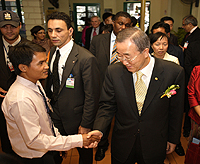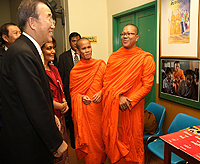A version of this story first appeared on unicef.org

During a recent visit to a youth centre in the capital, Vientiane, Mr Ban met representatives of people living with HIV (PLHIV) including Mr Kinoy, from the Lao Network of People Living with HIV (LNP+).
Photo credit: UNICEF
Lao PDR/2009/Holmes.
The United Nations Secretary-General, Mr Ban Ki-moon, praised the efforts of the UN Country Team and its partners to support prevention, treatment, care and support activities for people living with HIV, and to raise knowledge and understanding of the issue in Lao PDR.
During a recent visit to a youth centre in the capital, Vientiane, Mr Ban met representatives of people living with HIV (PLHIV) including Mr Kinoy, from the Lao Network of People Living with HIV (LNP+).
Mr Kinoy thanked the Secretary-General for all the UN’s support to PLHIV in the Lao PDR. He said it was vital to ensure continued free access to treatment, care and support services for all in need, to address stigma and discrimination at all levels, and to strengthen the participation of PLHIV in the national response to AIDS.
The Joint UN Team on AIDS in Lao PDR is supporting PLHIV and a greater involvement of people living with HIV in many parts of the country, through capacity building, direct support for activities, and resource mobilization efforts. UNAIDS advocates for meaningful involvement of people living with HIV as one of the key elements of a continuously successful response to AIDS in the country.
UNAIDS, together with a support consortium consisting of several partners, works closely with LNP+ in developing the network as “the voice” of PLHIV. Support is also provided to local level PLHIV support groups to strengthen their self management and representation.

Mr Ban told the young reporters about his recent meeting with UN+ (the UN system HIV positive staff group) and his personal commitment to address stigma and discrimination.
Photo credit: UNICEF
Lao PDR/2009/Holmes.
“I am very much impressed by all that you are doing to help young people of Laos, to teach them awareness and the importance of prevention of HIV/AIDS,” the Secretary General told reporters from a UNICEF-supported youth radio programme.
He told the young reporters about his recent meeting with UN+ (the UN system HIV positive staff group) and his personal commitment to address stigma and discrimination.
Although rates of HIV infection are low in Laos compared to other parts of South East Asia, there are signs that it is gaining hold among some adolescent groups.
During his visit to the Vientiane Youth Centre, Mr Ban applauded the work being done by young counselors and volunteers – including a group of Buddhist monks – for helping people living with HIV to overcome stigma and integrate into society.
Pointing out that the global response to AIDS was a priority for the UN, Mr Ban added: “This is very important for the community, the government, and citizens of Laos to work together, to provide good counseling, provide good care and support and good source of encouragement to people living with HIV”.

During his visit to the Vientiane Youth Centre, Mr Ban applauded the work being done by young counselors and volunteers – including a group of Buddhist monks – for helping people living with HIV to overcome stigma and integrate into society.
Photo credit: UNICEF
Lao PDR/2009/Holmes.
Established in 2001 under the Lao Women’s Union, the Vientiane Youth Centre is a pioneering initiative designed to promote youth capacity development and empowerment. With assistance from the UN Population Fund, the UN Office on Drugs and Crime and UNICEF, the Centre supports a telephone hotline offering advice on AIDS issues, a clinic providing reproductive health services and peer-to-peer education.
Earlier during his visit to Laos (the first by any Secretary-General in nearly a quarter of a century), Mr Ban held talks with His Excellency, Choummaly Sayasone, President of the Lao PDR, and other government leaders. In an address at the inauguration ceremony for a new UN headquarters, the Secretary General said he was optimistic that Lao PDR would achieve the Millennium Development Goals and graduate from Least Developed Country (LDC) status by the target date it has set itself of 2020.
The Secretary-General described a newly-released Millennium Development Goals report as a valuable tool for the Government and its development partners. To achieve the improvements still required in several areas, he called for “greater investments in human development, the social sector and environmental sustainability.”
In an address to more than 200 UN staff members working here, Mr. Ban said fostering a collaborative spirit among the various UN agencies was the most effective means of promoting development.






